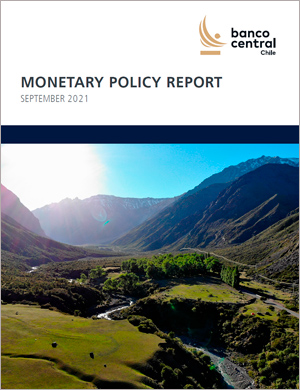Monetary Policy Report September 2021
Monetary Policy Report September 2021

The Chilean economy has made a rapid recovery from the recession caused by the Covid-19 pandemic, far exceeding expectations. This recovery has been made possible by the adaptive capacity of businesses and individuals and the breakthrough in the vaccination process, which has allowed for a significant process of openness. All of this was underpinned by the largest deployment of policy measures ever known in Chile in the face of an exogenous shock, as well as by an international environment marked by simultaneous action to contain the crisis, spearheaded by the central banks and other authorities of the world’s largest economies. However, the extension and persistence of some local measures, coupled with households’ high propensity to consume the resources received, has had an impact on private spending that has surpassed everyone’s forecasts. In a context in which supply has yet to fully recover, this has significantly changed our assessment of the pressures facing the economy, reflected in an increase in inflation and its near-term outlook. The depreciation of the peso has also contributed, partly due to the perception of a worsening of the economy’s fundamentals resulting from the liquidation of long-term savings through successive massive withdrawals of pension savings and the deterioration of the fiscal accounts, all in a climate of high local uncertainty. Thus, interest rates, risk premiums and the stock market’s performances look poor when compared to their external similes. The need to avoid the accumulation of macroeconomic imbalances which, among other consequences, could lead to a more persistent increase in inflation beyond the two-year 3% target, has led the Board to alter the monetary policy stance. The rapid evolution of the macroeconomic scenario, inflation expectations and sensitivity scenarios associated with greater pressures on prices, configure a scenario where the Central Bank has to act promptly to ensure inflationary convergence. For this reason, at its August meeting the Board raised the MPR by 75 basis points (bp) to 1,5% after having raised it by 25 basis points in July. It also estimates that for inflation to converge to the target it will need to continue to withdraw the monetary impulse, bringing the MPR at levels similar to its neutral towards the middle of the first semester of 2022. From there onwards the evolution of the MPR will depend on the occurrence of the sensibility scenarios described by the interest rate corridor.
What does this MP Report tell us?

The economy is growing strongly, boosted by public policies, adaptation capacity to the new circumstances and pandemic control.

However, it is important that consumption does not grow to a point where it pushes up inflation, as this would be particularly detrimental to lower-income people.

The economy is growing strongly, boosted by public policies, adaptation capacity to the new circumstances and pandemic control.
- The normalization of permanent income, together with the resources households have received from the universal emergency family income IFE and pension fund withdrawals have triggered a major increase in the quantity of money available for spending.
- Higher amounts of money available has coincided with the opening of the economy and the better sanitary situation, strongly boosting consumption.
- Spending has been concentrated in durable goods, including TV sets, furniture, cars, and the like, while services continue to lag due to customer capacity constraints imposed by the pandemic.
- However, the measures that have increased people’s disposable income cannot last forever, as they imply a costly, heavy burden on the country.
- In fact, the price of the dollar and mortgages are already rising, mainly because of concerns regarding how long the fiscal aid will last or whether new pension fund withdrawals will be allowed.

However, it is important that consumption does not grow to a point where it pushes up inflation, as this would be particularly detrimental to lower-income people.
- Consumers’ demand for various products has soared. However, in some cases inventories are not sufficient to sell because of pandemic-related difficulties in producing, importing and distributing the goods. This has resulted in inflation increases.
- The higher price of the dollar also plays a role in the inflation of imported products.

The Central Bank is taking measures to avoid inflation from spinning out of control and thus protect people’s wallets.
- The main tool to control inflation is the monetary policy interest rate.
- To combat rising inflation, the Central Bank has raised the policy rate since July.
- Among other things, avoiding a disproportionate rise in inflation will keep UF increases at bay. This will prevent a rise in mortgage installments, rents and other personal debts.

A more stable economy and controlled inflation will help solve the problems caused by the crisis, including lost women employment and country savings.
- It is important that employment recovers so that everyone can have the resources to progress and achieve their goals. Furthermore, this will help to continue sustaining the country’s growth going forward.
- In this sense, it is paramount for women to be able to return to work. Many of them have been unable to seek employment because of children not going to school or difficulties to find help for childcare at home.
- It is also important that the country can replenish the savings it has exhausted during this crisis. The country’s history provides examples of how important it is to have resources saved for difficult times.
Presentations
Presentación del Informe de Política Monetaria septiembre 2021
Conferencia de prensa, Informe de Política Monetaria
- Presidente Mario Marcel, Presentación IPoM septiembre 2021 en el Senado
- Governor Mario Marcel, Monetary Policy Report September 2021 in Icare
- Vicepresidente Joaquín Vial, Presentación IPoM septiembre 2021 en Universidad del Desarrollo
- Consejero Pablo García, Presentación IPoM septiembre 2021 en Facultad de Economía y Negocios de la Universidad Andrés Bello
- Consejera Rosanna Costa, Presentación IPoM Septiembre 2021 Club Monetario de la Universidad Finis Terrae
- Consejero Alberto Naudon, Presentación IPoM Septiembre 2021, Universidad Católica
- Consejero Alberto Naudon, Presentación IPoM Septiembre 2021, Universidad de los Andes
